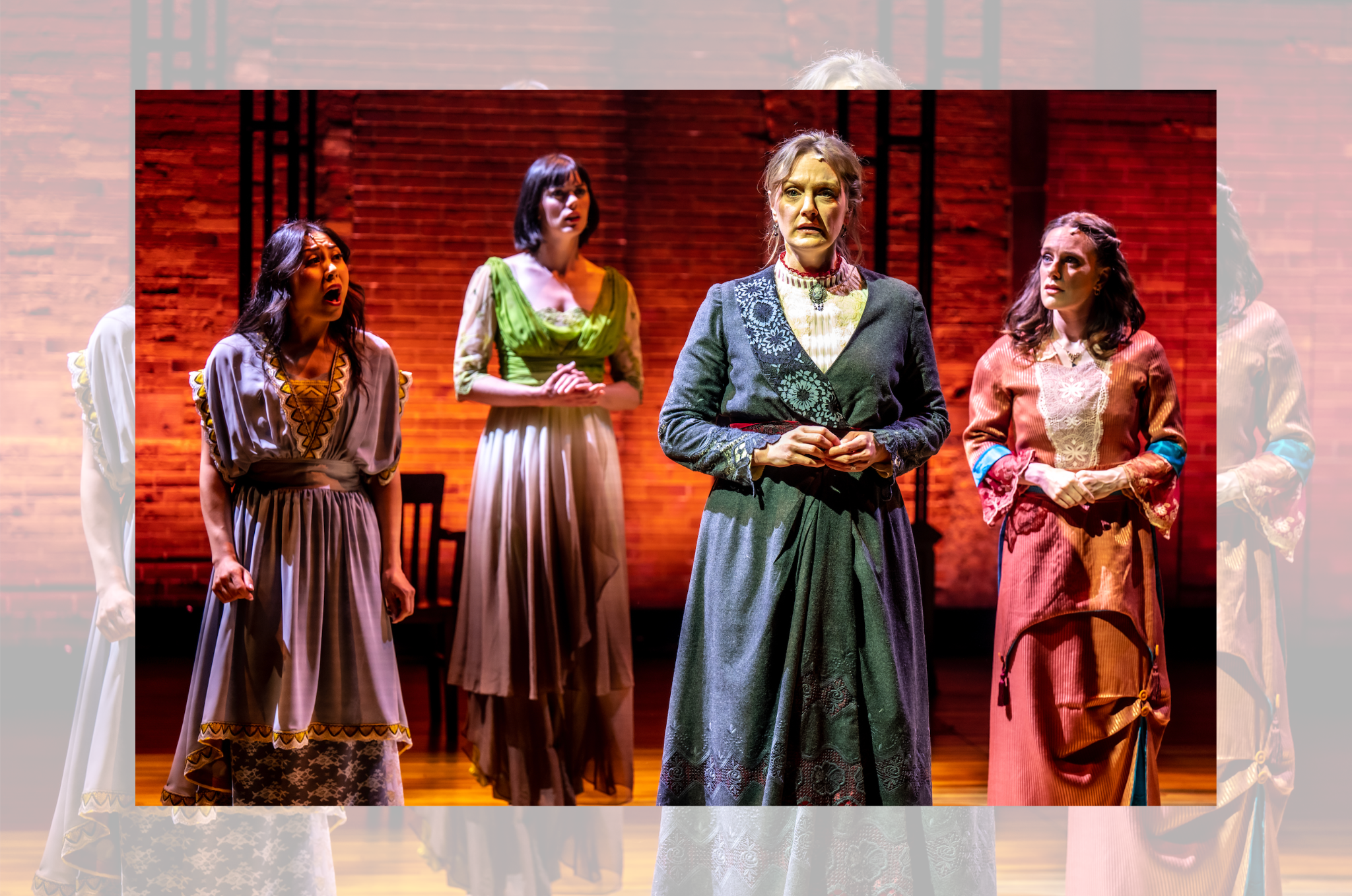REVIEW: Kelly v. Kelly at Musical Stage Company/Canadian Stage
Innovative musical theatre writer Britta Johnson began her three-show Musical Stage Company (MSC) “Crescendo Series” residency with a memory musical about daughterhood (Life After, in 2017).
After a pandemic delay, she’s continuing with another one — Kelly v. Kelly, which MSC is producing in association with Canadian Stage at the Berkeley Street Theatre. The show, based on a real 1915 New York City court case, doesn’t adhere to a totally unified artistic statement; but Johnson, bookwriter Sara Farb, and director Tracey Flye find enough theatrical riches in each individual moment to make this lack of unity spellbinding rather than frustrating.
Aristocrat Helen Kelly (Jessica Sherman) has charged her rebellious daughter Eugenia (Eva Foote) with incorrigibility on account of an affair with charismatic tango dancer Al (Jeremy Walmsley), and the two are facing off in trial. Eugenia self-represents, while Helen is backed by a smarmy lawyer (Joel Cumber). The odds are stacked against Eugenia, but she doesn’t seem to mind: to her, the case is a game.
Various witnesses come to the stand in support of Helen, and their statements set off Eugenia’s memory. After an expository number about her childhood (“It Used to Be Better”), the show depicts Eugenia’s recent immersion in the seedy world of tango. The memories get progressively more recent, eventually catching up with the trial.
Kelly v. Kelly’s courtroom is socially rigid and visually confining, a microcosmic representation of the larger patriarchal society. Lorenzo Savoini’s set is a 3-sided rectangle of hard wooden chairs backed by an industrial-looking upper platform featuring thin metal bars intersecting at right angles. His ominous, red-forward lighting doubles down on this rectangularity by conjuring a cage-like grid of shadows on the floor, visually imprisoning Eugenia before the court has a chance to.
A girthy, deliberately plucked bassline buttresses an early number offering exposition on the case; and though most of the other court scenes aren’t sung, Mike Jackson’s judge speaks in a slow, robust baritone that subtly echoes that bassline throughout. It’s a heavy, restricting environment in which only Helen’s lawyer has the agency to move around freely.
Eugenia’s memories are much lighter. Since the courtroom has no podiums or tables, only chairs, it’s easy for her to get up and explore her remembered locations, which the lights mark out via cloudy patterns in polychromatic shades. Though the smoky back rooms of tango life might suggest ferocious, up-tempo dance numbers, Johnson works against this assumption: the otherworldly tangos are actually slower than the music of the court. As desire bends the accuracy of Eugenia’s memory, Johnson’s music mutates with it, becoming less literal and more expressive.
A song depicting Al and Eugenia’s first encounter has a particularly brilliant moment of friction between music and lyric: though it’s initially an intimate Al solo, when he sings the lyric “life is lonely,” the chorus enters and repeats those words in harmony. Eugenia, in her romantic daze, is no doubt imagining how Al could make her life less lonely; the music richly parallels that realization by literally making his voice less lonely. The chorus then moves to hyper-crunchy harmonies, complicating the innocence of Eugenia’s memory with a dose of eeriness. And the five-piece band, led by Jonathan Corkal-Astorga, backs these vocals with their own chunk of dissonance (arrangements are by Lynne Shankel). This kind of complex harmonic storytelling is typical of Kelly v. Kelly’s memory world and Johnson’s work more generally.
Foote and Walmsley’s performances channel the freeness of that memory world. While the court is a realm of booming voices, calculated manipulation, and institutional performativity, the rebellious youngsters are less heightened. Foote is so realistic that she could well be a character in a non-musical play, while Walmsley grounds even Al’s most manipulative moments in truth.
Sherman’s elemental Helen lives somewhere between the two worlds. She moves and speaks with lightness, yet sings with the heft of the court. A beltress of the highest order, her voice provides much of the show’s emotional wallop.
Since the idea of being sued for incorrigibility is so distinctly 1910s, the show’s contemporary relevance could be easy to miss. It’s of course true that the justice system still upholds the patriarchy, but the show does not always force the audience to grapple with those modern-day parallels. The exception is a bitingly satirical recurring bit about misogyny: horrified at the idea of women’s suffrage, the court men break into grandiose asides lamenting the evils of “the modern woman.” Musically, these digressions seem to throw back to operetta. The ironic out-of-placeless of this genre feels distinctly contemporary and perhaps even invokes the hysterics of incel culture.
An odd thing about the show’s memory structure is that the memories, largely of the affair plot, do not always shed light on the mother-daughter relationship at the centre of the show. This contrasts Life After: in that show, protagonist Alice’s dive into memory lets her explore (and dramatize) her relationship with her dead father. Eugenia’s memories don’t always pave the way for similar explorations. But then this lack of mother-daughter time is partially Kelly v. Kelly’s point: the toxic institution of the court censors all their interactions, impeding their ability to connect. So if we’re left wanting a little more of them together, that makes sense: they probably want the same.
Whatever questions there are about the piece as a whole, Kelly v. Kelly is utterly gorgeous on a moment-to-moment level. It’s so dense with emotion that it will undoubtedly reward repeat viewings, revealing more and more layers over time.
Kelly v. Kelly runs until June 18 at Canadian Stage. Tickets are available here.
Intermission reviews are independent and unrelated to Intermission’s partnered content. Learn more about Intermission’s partnership model here.













Comments